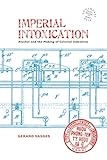Imperial Intoxication : Alcohol and the Making of Colonial Indochina / Gerard Sasges; ed. by David P. Chandler, Rita Smith Kipp.
Material type: TextPublisher: Honolulu : University of Hawaii Press, [2017]Copyright date: ©2017Description: 1 online resource (280 p.) : 8 b&w illustrations, 2 mapsContent type:
TextPublisher: Honolulu : University of Hawaii Press, [2017]Copyright date: ©2017Description: 1 online resource (280 p.) : 8 b&w illustrations, 2 mapsContent type: - 9780824866884
- 9780824866914
- 950
- online - DeGruyter
- Issued also in print.
| Item type | Current library | Call number | URL | Status | Notes | Barcode | |
|---|---|---|---|---|---|---|---|
 eBook
eBook
|
Biblioteca "Angelicum" Pont. Univ. S.Tommaso d'Aquino Nuvola online | online - DeGruyter (Browse shelf(Opens below)) | Online access | Not for loan (Accesso limitato) | Accesso per gli utenti autorizzati / Access for authorized users | (dgr)9780824866914 |
Frontmatter -- Contents -- Acknowledgments -- Notes on Usage and Sources -- Introduction -- 1. Inheritances -- 2. A Scientific Monopoly -- 3. Fiscal Logics -- 4. The Limits of Sovereignty -- 5. The Great Service -- 6. Oppression, Resistance, Rebellion -- 7. The Political Economy of Alcohol -- 8. Evolutions -- Epilogue -- Appendix One: Ingredients in Chinese Ferment -- Appendix Two: Alcohol Use in Upland Regions -- Appendix Three: The Fontaine Group -- Notes -- Bibliography -- Index
restricted access online access with authorization star
http://purl.org/coar/access_right/c_16ec
Making liquor isn't rocket science: some raw materials, a stove, and a few jury-rigged pots are all that's really needed. So when the colonial regime in turn-of-the-century French Indochina banned homemade rice liquor, replacing it with heavily taxed, tasteless alcohol from French-owned factories, widespread clandestine distilling was the inevitable result. The state's deeply unpopular alcohol monopoly required extensive systems of surveillance and interdiction and the creation of an unwieldy bureaucracy that consumed much of the revenue it was supposed to collect. Yet despite its heavy economic and political costs, this unproductive policy endured for more than four decades, leaving a lasting mark on Indochinese society, economy, and politics.The alcohol monopoly in Indochina was part of larger economic and political processes unfolding across the globe. New research on fermentation and improved still design drove the capitalization and concentration of the distilling industry worldwide, while modernizing states with increasing capacities to define, tax, and police engaged in a never-ending search for revenue. Indochina's alcohol regime thus arose from the same convergence of industrial potential and state power that produced everything from Russian vodka to blended Scotch whisky. Yet with rice liquor part of everyday life for millions of Indochinese, young and old, men and women, villagers and city-folk alike, in Indochina these global developments would be indelibly shaped by the colony's particular geographies, histories, and people.Imperial Intoxication provides a unique window on Indochina between 1860 and 1939. It illuminates the contradictory mix of modern and archaic, power and impotence, civil bureaucracy and military occupation that characterized colonial rule. It highlights the role Indochinese played in shaping the monopoly, whether as reformers or factory workers, illegal distillers or the agents sent to arrest them. And it links these long-ago stories to global processes that continue to play out today.
Issued also in print.
Mode of access: Internet via World Wide Web.
In English.
Description based on online resource; title from PDF title page (publisher's Web site, viewed 02. Mrz 2022)


